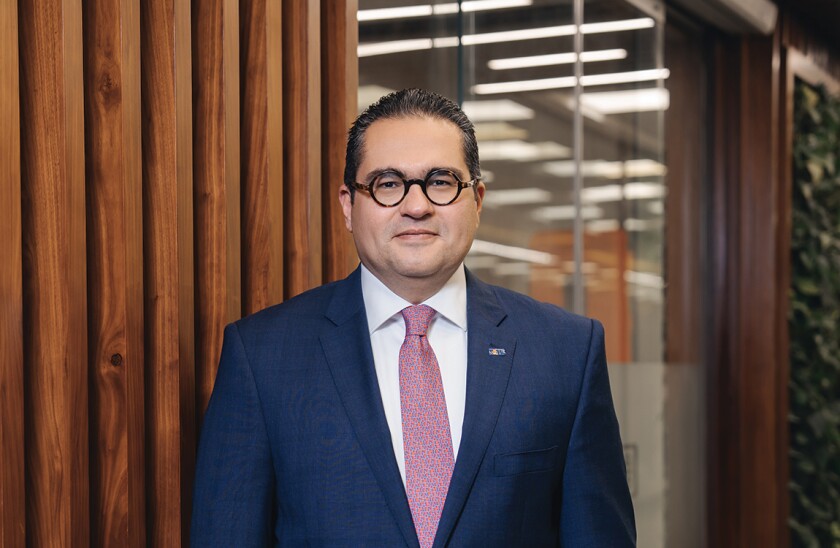How do you see the Egyptian economy evolving in the next few years, and what factors do you believe will drive growth?
Thanks to the support of financial institutions, the outlook for Egypt is positive. As illustrated in Egypt’s 2028 plan, the government will rationalise borrowing and megaproject spending, encourage exports and limit imports, grant incentives to the manufacturing industries, create new tax benefits and legislation for foreigners and encourage tourism. Policy measures and structural reforms will attract investment, reduce public debt, improve private sector financing and drive sustainable economic growth.
The Egyptian government also plans to utilise funds in a way that most efficiently addresses economic barriers. For example, in the 2023-24 financial year, the government will give precedence to finishing projects that have reached a completion rate of 70% or higher.
It will also restrict external financing and not take on projects that require more borrowing. In terms of encouraging exports and limiting imports, the government has provided incentives like tax exemptions and subsidies for exporters to lower production costs and improve competitiveness. Import tariffs have increased to encourage the consumption of local goods and there are incentives to boost domestic manufacturing.
How well prepared are the economy and banking sector for potential challenges like swings in energy prices or geopolitical instability?
Egypt’s unique geographic position has made it a pivotal player in geopolitical negotiations throughout history. The Central Bank of Egypt has initiated a robust macroprudential policy that evaluates the financial system’s stability through regular stress tests and early warning systems. In addition, the CBE’s regulatory framework has enabled Egyptian banks to maintain financial resilience, with high levels of liquidity and solvency ratios. All this has elevated confidence in the banking sector.
What are some of the highlights from CIB’s financial performance over the last year?
CIB’s financial performance is a proof of its sustained success and resilience in a dynamic financial landscape. Consistent growth in revenues, profits and market share has solidified its position as a key player in the industry. This success is further evidenced by the bank’s ability to adapt to changing market conditions while maintaining strong performance.
Today, the bank continues to deliver value to shareholders and customers, supporting its longstanding reputation for financial stability and strategic excellence. In the first half of 2024, CIB recorded net income of EGP27.5bn, up 96% year on year.
Revenues were EGP46.3bn, which represented an 82% increase. Our deposits grew by 27% and loans grew by 24% over the same
period. The bank was able to maintain its asset quality, evidenced by a drop in non-performing loans from 5% to 4.1%.
What are CIB’s strategic priorities over the next three to five years, and how do you plan to achieve them?
CIB’s strategy is centred on creating value for all its stakeholder. It consists of three main themes: growing and diversifying revenue sources to achieve sustainability and resilience; becoming a digital leader in customer service, sales and operations; and capitalising on the success of the corporate and liabilities franchises.
The bank recognises the attractive opportunities available in the small and medium-sized enterprise and retail sector. We will continue to elevate our digital capabilities and use a program-based pricing approach to re-energise SMEs.
CIB is also committed to providing customers with unique digital value propositions, new digital channels, innovative solutions and a well-defined customer journey. It does this through putting its customers first and integrating innovation across the bank.
CIB will continue to focus on capturing unique opportunities that complement its Africa expansion aspirations, as demonstrated through its acquisition in Kenya.
How is CIB addressing sustainability and environmental, social and governance issues, and what role do these play in the bank’s strategy?
CIB aims to further integrate ESG efforts into its operations, acknowledging its leading role as an institution that serves the environment and society. The bank’s strategy focuses on sustainable finance advocacy, environmental and social and climate risk, revenue generation and reducing the bank’s ecological footprint.
CIB integrates environmental, social and governance aspects within its business operations and the communities it serves. Our approach to sustainable finance constantly evolves to offer innovative solutions, cultivate risk management and integrate ESG practices across the bank’s operations.
In partnership with the International Finance Corporation, CIB is the first Egyptian bank to launch a corporate green bonds programme. Its main objective is to help corporate clients transition towards green technology and to provide financing for projects that address environmental issues, including natural resources depletion, air, water or soil pollution, climate change and loss of biodiversity. The bank has seen substantial business growth under this programme, where portfolio utilisation increased to reach a total eligible loan amount equivalent to $136m.
How is digital transformation shaping the evolution of banking in CIB, and what technological innovations is CIB prioritising?
CIB is committed to enhancing Egypt’s digital transformation and constantly invests in its digital channels. Through integrating state-of-the-art technology, the bank strives to provide its customers with a secure and seamless banking experience.
CIB continuously develops its digital channels and data analytics to ensure sales proficiency and offer customers exclusive digital value propositions.
To complement the bank’s digital transformation journey, CIB has invested in a spectrum of financial inclusion initiatives, including its Smart Wallet, Bedaya account, new card initiatives such as Meeza prepaid cards, and financial literacy sessions. CIB’s Smart Wallet offers a cost-effective and secure platform for financial transactions, serving both banked and unbanked customers.
